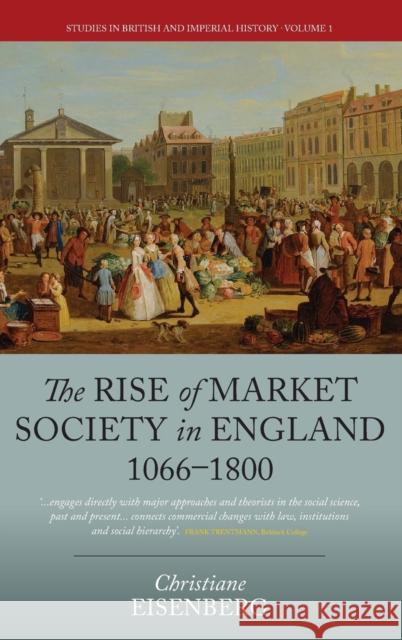The Rise of Market Society in England, 1066-1800 » książka
The Rise of Market Society in England, 1066-1800
ISBN-13: 9781782382584 / Angielski / Twarda / 2013 / 176 str.
The Rise of Market Society in England, 1066-1800
ISBN-13: 9781782382584 / Angielski / Twarda / 2013 / 176 str.
(netto: 481,16 VAT: 5%)
Najniższa cena z 30 dni: 498,70
ok. 22 dni roboczych.
Darmowa dostawa!
Focusing on England, this study reconstructs the centuries-long process of commercialization that gave birth to the modern market society. It shows how certain types of markets (e.g. those for real estate, labor, capital, and culture) came into being, and how the social relations mediated by markets were formed. The book deals with the creation of institutions like the Bank of England, the Stock Exchange, and Lloyd's of London, as well as the way the English dealt with the uncertainty and the risks involved in market transactions. Christiane Eisenberg shows that the creation of a market society and modern capitalism in England occurred under circumstances that were utterly different from those on the European continent. In addition, she demonstrates that as a process, the commercialization of business, society, and culture in England did not lead directly to an industrial society, as has previously been suggested, but rather to a service economy. Christiane Eisenberg is Professor of British History at the Centre for British Studies at the Humboldt University, Berlin. Her interests lie in the comparative social and cultural histories of Germany and Britain in the 19th and 20th centuries. Internationally she is known for her work on the diffusion of modern sport.
Focusing on England, this study reconstructs the centuries-long process of commercialization that gave birth to the modern market society. It shows how certain types of markets (e.g. those for real estate, labor, capital, and culture) came into being, and how the social relations mediated by markets were formed. The book deals with the creation of institutions like the Bank of England, the Stock Exchange, and Lloyds of London, as well as the way the English dealt with the uncertainty and the risks involved in market transactions. Christiane Eisenberg shows that the creation of a market society and modern capitalism in England occurred under circumstances that were utterly different from those on the European continent. In addition, she demonstrates that as a process, the commercialization of business, society, and culture in England did not lead directly to an industrial society, as has previously been suggested, but rather to a service economy.Christiane Eisenberg is Professor of British History at the Centre for British Studies at the Humboldt University, Berlin. Her interests lie in the comparative social and cultural histories of Germany and Britain in the 19th and 20th centuries. Internationally she is known for her work on the diffusion of modern sport.











